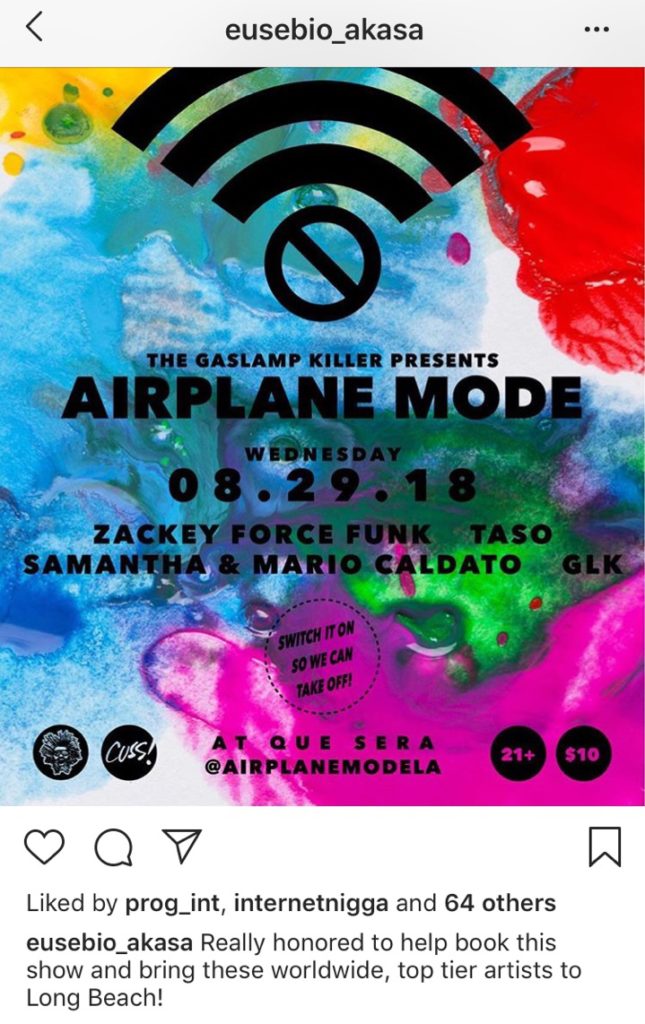The Gaslamp Killer, Famed DJ and Alleged Rapist, Booked to Play Que Sera Wednesday
13 minute read– Story updates –
8/28/18, 6:27 p.m. update: The show at Ashley’s Bar was cancelled, according to the establishment’s owner Steve Massis.
“We booked the show not knowing. We don’t know anything about this artist. All we do is try to serve good food and play music and then all this came up,” he said. “We started getting some phone calls from people I respect in the city. Asked us not to do the show and we didn’t do it.”
He added that a third party booked the show.
There’s no word on whether the show will be booked a third time.
“Props to Que Sera and Ashley’s for showing this respect for the community. We look forward to continuing to dialogue with them (and supporting acts at their venues)!” Protect Survivors: Long Beach Allies wrote in the Facebook event page for a protest that had been planned outside the show.
8/29/18, 3:49 p.m. update: The show has been re-booked at Ashley’s Bar, 1731 East Fourth Street. The show’s promoter, Eusebio Akasa, posted on Instagram, “Can’t stop, won’t stop!” (Update: The post has since been deleted. We have a screenshot below.)

Protect Survivors: Long Beach Allies will be protesting outside of new venue. Facebook event here.
8/29/18, 2:50 p.m update: Que Sera staff informed FORTHE Media that the show has been cancelled.
Editors’ note: This issue is a sensitive one, and there are many conflicting thoughts and feelings. We hope the piece below by one of our members is a contribution to a larger conversation happening around us. We welcome questions, comments, submissions to our journal, and increased public discourse, which is why we exist to begin with, and why we choose to provide space for coverage of difficult but necessary topics of social concern.
WARNING: This article contains a description of an alleged sexual assault.
William Bensussen, who performs as The Gaslamp Killer, is scheduled to perform at Long Beach music venue Que Sera on Wednesday amid rape accusations made by two women in October.
The controversial yet highly influential DJ became popular as a founding member of Low End Theory. Named after the Tribe Called Quest album, Low End Theory was a groundbreaking, weekly beats night in Los Angeles that ran for 12 years. Held at the Airliner in Lincoln Heights, the internationally-recognized event was co-founded by Bensussen and a grassroots group of DJs in 2006, and attracted the attention of everyone from Erykah Badu and Flying Lotus to Prince and Thom Yorke. After a decade-plus of collaboration, and just one day after the allegations were made, the Low End Theory made an “official statement” that they were “parting ways” with The Gaslamp Killer.
Low End Theory came to an end altogether earlier this month.
The controversy surrounding Bensussen has raised questions among Long Beach musicians and show-goers about the ethics involved in deciding who is allowed to take the mic in community spaces and how much is being done to vet performers. The booking has spurred criticism from some musicians who often perform at the venue. Some went so far as to offer to organize a counter line-up for the evening in hopes the venue will drop the show.
Que Sera’s management did not return multiple calls or reply to an email seeking comment.
The Case
William Benjamin Bensussen, who performs as The Gaslamp Killer, became popular as a founding member of Low End Theory. In 2006, the Los Angeles music collective began hosting an eponymously named hip hop-influenced beats night Wednesdays at The Airliner in Lincoln Heights. After the sexual assault allegations came to light in October, Low End Theory dropped him from the collective the very next day, despite a decade-plus of collaboration.
Chelsea Tadros wrote on Twitter in October that Bensussen raped her and her friend RaeAn Medina after a party at The Standard in Los Angeles in July of 2013. Tadros wrote that they met Bensussen at the pool, and after being given a laced drink, were taken to Bensussen’s apartment where she lost consciousness. Tadros’ tweet goes on to say that she recalls some fragmented memories of Bensussen on top of her and sexually assaulting her. After the encounter, Bensussen purportedly took them back to their cars in front of the hotel. She says she remained woozy and sick the rest of the evening.
Bensussen has categorically denied the charges, saying the encounter was consensual. He brought a defamation lawsuit against Tadros and Medina one month after the accusations, seeking damages of over $5 million. That suit against Medina was dismissed by a judge who cited an anti-SLAPP motion made by Medina’s attorney. The anti-SLAPP law prevents accusers from being silenced by defamation lawsuits designed to sap time and resources.
“This. is. why. women. stay. silent.” said Tardos, responding via Twitter. “I am not and will not be intimidated. GLK can sue me until I’m bankrupt because I have nothing to hide. I welcome a resolution in a court of law.”
Bensussen wrote on Facebook in May that the allegations are not only “false” but also “logistically impossible.” He cites a claim by the judge that there are inconsistencies in Tadros’ statement: witness testimony by a friend of Medina who was at The Standard and did not recall drinks being spiked and says Tadros and Medina left of their own volition. Bensussen’s roommate corroborates his assertion that the two women entered their apartment of their own power, but also admits he was in his room the entire time. A toxicologist report also found that Tadros’ description of the effects of the drugs were inconsistent with her reported symptoms.
Erica Kim, Tadros’ lawyer, rejected Bensussen’s assertions, telling Pitchfork: “He seeks trial by media and attempts to exonerate himself by grossly distorting the facts of this case.” Kim stressed that O’Donnell has not found that Tadros’ account itself is inconsistent, but that it simply conflicts with Bensussen’s telling of the events. The toxicology report retained by Bensussen’s legal defense was dismissed by the court—it never included a physical examination or interview with Tadros. One of Bensussen’s key witnesses, Christopher “Edward Knight” Salguero, has himself been accused of sexual misconduct and, because of this, is on a list of those accused of sexually inappropriate behavior within the fashion industry.
The defamation suit against Tadros was allowed to move forward, denying an anti-SLAPP motion, saying that Bensussen established the “minimal merit” of Tadros’ claim which provides grounds for a defamation lawsuit.
O’Donnell goes on to clarify that by upholding the defamation lawsuit against Tadros she is in no way making a judgement on whether the defamation actually occurred. That is “for the fact-finder to determine,” O’Donnell emphasized.
Que Sera
Que Sera is located along the Seventh Street corridor of Long Beach and hosts nightly events with eclectic lineups. The venue generally books established local, regional, and touring acts while also giving stage-time to young up-and-coming performers. Que Sera started out as a lesbian bar and is a space that prides itself on inclusivity. Along with diverse lineups representing many different musical styles, Que Sera also hosts a monthly Queer night which serves as a safe space for individuals of all gender identities.
However, this is not the first time the venue has come into controversy recently. A show was cancelled last December because the bill contained a band that some show-goers felt had a racist name. There was community backlash via social media, messages sent, and the event was ultimately pulled.
Tomisin Oluwole
Fragmented Reflection I, 2021
Acrylic on canvas panel
24 x 30 inches
Click here to check out our interview with Tomisin Oluwole, a literary and visual artist based in Long Beach.

Instead of gunking up our site with ads, we use this space to display and promote the work of local artists.
The Gaslamp Killer show was booked by Long Beach DJ Eusebio Akasa. When asked about his involvement he said: “This is not my show. This is 100% [The Gaslamp Killer’s]. I was merely an informal messenger between the artist and the venue.” Akasa subsequently sent a link to Benmussen’s denial of the allegations.
But this contrasts with Akasa’s July 30 Instagram that includes a flyer for the show and the caption: “Really honored to help book this show and bring these worldwide, top tier artists to Long Beach!” (Update: This post has also been deleted since publication. We have a screenshot of the post below.)

Follow-up questions regarding specifics about Akasa’s involvement with the event and his prior awareness of the allegations and possible blowback from the community were not responded to at press time.
As is usually the case at Que Sera, the show was set up by the informal means of the promoter contacting a bartender. Critical to the steady flow of underground talent, promoters present a pitch to a Que Sera staff member who then approves the lineup. Shows are not typically cleared with the owners, as seems to be the case with the GLK booking, according to several sources familiar with the process.
Concerns from the Community
Esther Kang, a Long Beach-based musician who regularly plays at Que Sera, is not happy about The GLK’s appearance and will not be attending the show. But she takes special care to not fault the ownership or management for the situation, who were ostensibly unaware of the allegations when this event was confirmed.
“I felt confused and angry when I saw this [show being announced],” Kang said in an email. “By allowing [The GLK] to perform at Que Sera, I feel that we would be condoning his actions as a community.”
To be clear, while the allegations against The GLK are very serious, he has not been criminally charged and his defamation lawsuit is ongoing.
After the show was announced, Kang spoke with the bartender that approved it.
“She had absolutely no idea about the rape allegations against GLK,” explains Kang. “If they had known about it in advance, I have no doubt they would have rejected his show because he goes against everything that Que Sera stands for.”
Along with Kang, Abbey Barnett is a member of the band Koibito. She promotes shows at Que Sera regularly and is a member of Grn+Gld, a local music and art collective composed of beat makers and visual artists who host a night at the venue every second Thursday. She describes the Long Beach beats scene as being very tight-knit while still being very inclusive.
“I was disappointed,” said Barnett about learning GLK would be playing a show at Que Sera. “It’s at a place I call home… someplace I feel safe and really welcome.”
Barnett reached out to Que Sera when she learned about the show, hoping to get it cancelled. She also says that the venue’s management did not know about the allegations against GLK. Barnett offered to rebook the event if they wanted to cancel it, but has not heard back from them at the time of publication.
As a result, Barnett will be boycotting the event. She says that she would support any protest the show might elicit, but believes a low turn-out to the event would be the most effective means to hold GLK responsible for the accusations if the show does take place. Barnett said that she was particularly disgusted by the way GLK marketed this appearance (along with two stops, one in Highland Park and the other in San Diego) as an “airplane mode” tour. Officially relating his lack of social media presence to a Low End Theory tradition of not allowing cell phones at shows, Barnett finds it to be a cruel reflection of the silence and erasure that characterizes rape culture.
As far as the validity of the allegations made against GLK, Barnett says that she stands with the potential victims and that it’s better to be “safe than sorry” when considering to host an accused sexual predator in a community space.
Dylan Wood, of the band Very Crush, has played at Que Sera numerous times throughout the years. He says he, like many friends also active in the scene, was “mortified” when he heard GLK was playing a show in Long Beach and does not believe he should be allowed to play.
“Que Sera should not be the place to hold this,” said Wood.
A newly-formed local organization, Protect Survivors: Long Beach Allies, also called for protest of the event. According to an email we obtained that the group sent to the venue, PSLBA formed “to ensure that people accused of rape or sexual assault are not given a platform elevating them above alleged victims.”
Keayva Mitchell is a member of PSLBA, and a survivor of sexual assault. She has personally, whether intentional or not, felt silenced after coming out with her story.
“We think if an artist is accused [by] multiple people of rape, then venues have the responsibility to provide a safe space. There are plenty of great musicians out there that aren’t accused of rape or aren’t openly racist,” said Mitchell.
“There are a lot people who say they support a cause and champion these things,” she added. “[In Long Beach] we like to say that we’re very liberal, very progressive, and yet when things like this happen not enough people are standing up, not enough people are putting their money where their mouth is.”
Mitchell also sees the banning of accused sexual predators from performing as a “better safe than sorry scenario.”
PSLBA has spoken with staff at Que Sera, who they found to be sympathetic and responsive. They’re hoping that this can be resolved with a cancellation of GLK’s appearance.
“I think if an artist has been accused by multiple people of rape or assault that’s a discussion that needs to happen,” said Sarah Bedy, also with PSLBA.
“There is a lot of ambivalence, or people just don’t know what to do, when there’s accusations floating around,” says Bedy. “Should venues still be booking [accused sexual predators]? Should we as a community still be paying money to see them? In the age of #metoo, are we as Long Beach just going to look the other way when multiple accusations come forth?”
If you want to support our platform for Long Beach politics, art, and culture, donate to FORTHE by clicking here.


 joe@forthe.org
joe@forthe.org




